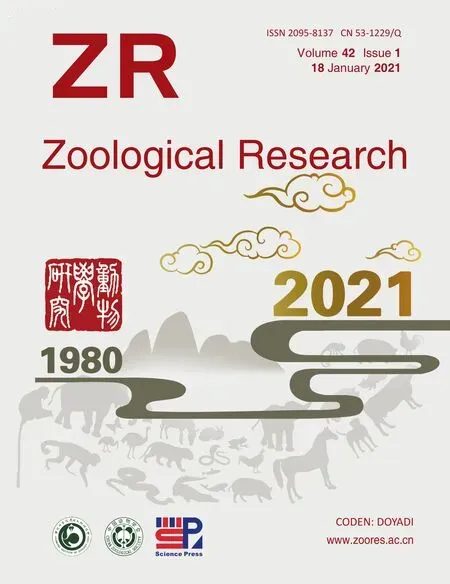The forty-year journey of Zoological Research:advancing with the times
Since its establishment in 1980,Zoological Research(ZR) has walked with many scientists during their academic careers(Yao & Zhang,2015; Yao et al.,2019).During this joyful holiday season and hopeful new year,we are incredibly pleased to share our wonderful news with all authors,readers,editorial board members,and peer reviewers ofZR.Due to its growing academic influence over the last several years,ZRhas attained its highest impact factor to date,reaching 2.638 by the end of 2019 (Q1,12th/169 SCI journals).Furthermore,its current CiteScore has reached 4.3 (as of December 2020),a nearly 60% increase since 2019.Meanwhile,both the publishing capacity and efficiency ofZRhave continued to expand.We are immensely proud of each of our efforts in promotingZR.Of note,your enduring support and faith have helped drive the sustained growth and advancement ofZR,which continues to evolve as a prominent journal in the zoological field.
With great support from each of you who have trustedZRwith publishing your excellent work,2020 has been an important year,with the release of a series of high-quality articles.These include timely reports on the coronavirus disease (COVID-19) pandemic,covering a variety of topics from animal models of SARS-CoV-2 infection and pathobiology of COVID-19,to the origin and dynamics of SARS-CoV-2 epidemiology (Gómez-Carballa et al.,2020;Gong et al.,2020; Liang et al.,2020; Song et al.,2020; Wong et al.,2020; Xu et al.,2020; Yu et al.,2020).The first report of a new primate species,Popa langur,from Myanmar has received word-wide attention since its first release (Roos et al.,2020).Furthermore,a novel study regarding hypobaric hypoxia (HH) exposure in non-human primates has helped advance our understanding of the pathology induced by acute HH and provides potential compounds for the development of neuroprotectant drugs for therapeutic treatment (Zhang et al.,2020).There are many more that could not be mentioned here due to the limit of space.However,all publications reflect the real mission ofZRin the field of zoology,that is,to promote science in a timely way to the benefit of society.
In the new year,we warmly welcome those interested in organizing an upcoming special issue/column to contact us for discussion.The 10th editorial board has performed its duties impeccably,though its term has ended on 31 December 2020.The 11th editorial board commences as of 2021 and includes 48 outstanding scientists from 11 countries across the world.We expect that this vibrant editorial board will work as tirelessly and efficiently as the outgoing one.We will continue to recruit new editorial board members to promoteZRwith their full support and endless enthusiasm.
The importance of high-profile publishing platforms has become well established in China in recent years.China has now built a solid foundation for publishing an increasing number of high-profile and high-quality journals with substantial academic influence and distinction.We will never forget whyZRwas established 40 years ago and will keep its mission firmly in mind.We believe thatZRwill become one of the main actors in the new era.Looking forward,ZRwill continue to focus on publishing exciting research on 1)Primates and Animal Models,2) Animal Diversity and Evolution,and 3) Conservation and Utilization of Animal Resources.As always,we hope for your enduring contributions and encouragement.We are proud to publish your representative works to highlight the advances in the field of zoology.Thank you again for your generous help and continued support ofZR.
Yong-Gang Yao,Editor-in-ChiefKunming Institute of Zoology,Chinese Academy of Sciences,Kunming,Yunnan650223,China
Xue-Long Jiang,Executive Editor-in-ChiefKunming Institute of Zoology,Chinese Academy of Sciences,Kunming,Yunnan650223,China
- Zoological Research的其它文章
- Chromosomal assembly of the Antarctic toothfish(Dissostichus mawsoni) genome using third-generation DNA sequencing and Hi-C technology
- Geographical range evolution of the genus Polypedates (Anura:Rhacophoridae) from the Oligocene to present
- Molecular and morphological evidence for a new species of the genus Typhlomys (Rodentia:Platacanthomyidae)
- Pitfalls of barcodes in the study of worldwide SARSCoV-2 variation and phylodynamics
- Contribution to the taxonomy of the genus Lycodon H.Boie in Fitzinger,1827 (Reptilia:Squamata:Colubridae) in China,with description of two new species and resurrection and elevation of Dinodon septentrionale chapaense Angel,Bourret,1933
- Dynamic evolution of transposable elements,demographic history,and gene content of paleognathous birds

